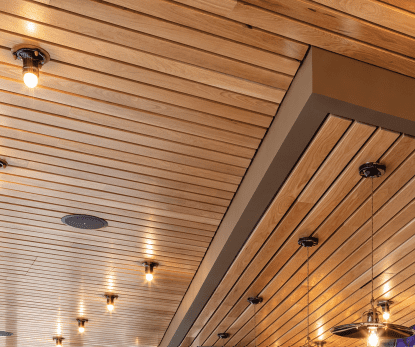At Rulon International, we’re known for our contributions to spectacular architectural projects throughout the nation. However, we also take great pride in our longstanding commitment to sustainability. For the manufacture of state-of-the-art wood panel wall and ceiling systems, we prioritize sustainably harvested wood, recycled content, and protection of indoor air quality.
As a natural, renewable resource, wood has a major role in meeting the growing demand for green construction materials. However, not all wood products are created equal. To use wood responsibly, it’s important to support sustainable timber production and efficient manufacturing processes that reduce waste and safeguard indoor air quality.
In the sections below, we’ll discuss the importance of responsible wood production and highlight the factors that differentiate sustainable wood products.
The Importance of Sustainable Wood in Modern Design
Wood is a timeless, versatile building material. From family residences to concert halls, wood offers superior beauty, acoustic benefits, and durability. Wood is also one of the few truly renewable resources that can be used in its natural form and harvested from replenishing sources.
Compared to other building materials, timber production has a lower carbon footprint and involves fewer harmful environmental impacts. When managed responsibly, timber production supports the growth and preservation of healthy forests that sequester carbon and supply useful lumber in perpetuity.
Environmentally Friendly Approaches in Wood Production
Sustainable wood involves an entire life cycle, from forestry to manufacturing to post-use recycling. The process begins with forest management practices that ensure the long-term health of timber sources.
Sustainable Forest Management
Sustainable timber production requires responsible forest management. Responsible forestry involves cyclical planting, growth, and harvesting. While some sections of a forest are growing, others are nearing maturity. The forest continuously sequesters carbon, supports local community uses, and provides wildlife habitat while simultaneously producing timber harvests.
To verify sustainable forest management and help customers make environmentally friendly purchases, timber producers participate in certification programs. The most prominent and trusted third-party certifier is the Forest Stewardship Council (FSC®).
Efficient Manufacturing Processes
Modern manufacturing technology emphasizes the reduction of wasted raw materials. When working with wood, waste reduction involves optimizing the dimensions of boards and using panel optimizations for cuts. These techniques reduce the demand for raw materials and improve the overall sustainability of the manufactured product.
Low-Impact Finishes and Treatments
Along with responsible foresty and efficient manufacturing processes, environmentally friendly wood involves the use (and non-use) of treatments and chemical finishes.
Treatments and finishes that are sometimes applied to wood products include:
- Wax
- Oil
- Shellac
- Lacquer
- Varnish
- Paint
To complete the production of a sustainable wood product, these finishes and treatments should be selected and used responsibly. That means non-toxic, low-VOC (volatile organic compounds) finishes that aren’t harmful to human health or air quality. High-quality, eco-friendly finishes improve the appearance and durability of wood while avoiding harmful environmental impacts.
End-of-Life Solutions for Wood Products
The 3 R’s (reduce, reuse, recycle) are fundamental to sustainability. Reusing and recycling are both meaningful ways to extend the lifespan of lumber. Wood can be salvaged from demolitions or discarded items, restored, and reused for construction or woodworking. Or, reclaimed wood can be processed into mulch or used as biofuel.
At Rulon International, we use both sustainably harvested wood and recycled content MDF cores.
Practical Purchasing Tips for Sustainable Wood Products
If you’re interested in using sustainable wood for your next construction project, consider a holistic view of sustainability that considers factors like product sourcing, manufacturing processes, waste reduction, and responsible chemical use.
If you want to discuss sustainability with a supplier or contractor, ask about:
- The geographic source of the timber (in which state or country the trees were grown)
- Certifications for sustainable forestry
- Chemical inputs during the manufacturing process (especially in regard to indoor air quality)
- Validity for green crediting programs such as LEED, Living Building Challenge, and the WELL Building Standard
Finally, it’s helpful to think of your own post-purchase care as a factor in your wood product’s sustainability. Regular maintenance helps to preserve the lifespan of wood, resulting in a more cost-effective and sustainable investment.
Choose Sustainable Wood Panels for Your Commercial Space
At Rulon International, we ensure that all of our wood is responsibly sourced and we employ innovative manufacturing processes that minimize waste. Visit our sustainability page to learn more about Rulon’s environmental commitments.
To discuss your next beautiful, sustainable wood panel project, contact Rulon International today.




